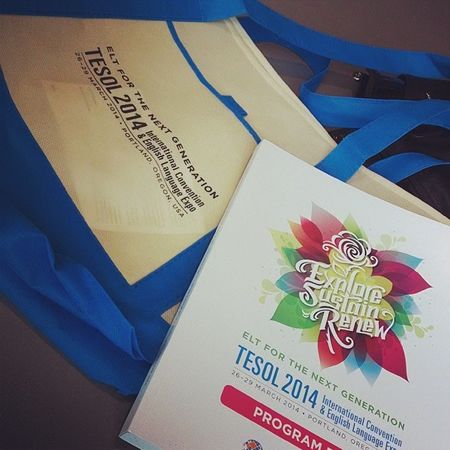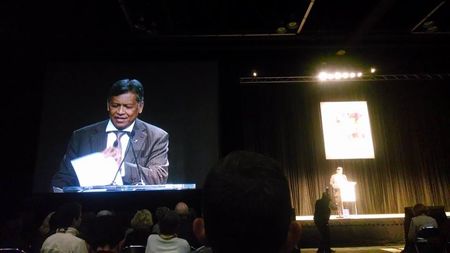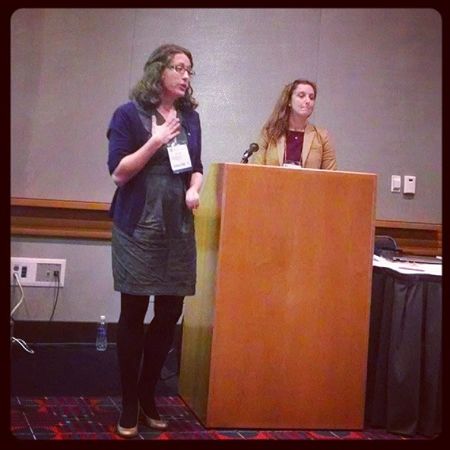Those of you who follow me on Facebook know that I’ve spent
the last week in Portland, OR. For those of you who don’t, well, I’ve spent the
last week in Portland. I left Orlando on Tuesday, immediately following my
classes, and flew to Portland for the purpose of attending the TESOL 2014
international conference. I’ll blog a little later about my non-TESOL
conference experiences in Portland; this post will be limited to my conference-specific
experiences. I’ll post about the rest of my Portland adventures later.
I have mixed feelings about the conference. On the one hand,
I saw a lot of really great presentations on topics that I found quite
interesting. Additionally, I was able to meet up with some really fantastic
people and have some really informative conversations. (Where else can you have
an academic discussion about Konglish?) On the other hand, I came to the
conference specifically for the job fair, and to be honest, I found the job
fair disappointing. But more on that later.
Wednesday was a pretty slow day at the conference. I
explored the convention center, and found myself a nice spot to sit and dig
through the 200+ page schedule of events to plan which presentations I wanted
to go see. I met a guy from Florida who had watched my presentation back in
2012 at the Central Florida TESOL conference on Low-Tech and No-Tech TESOL in places such as Kyrgyzstan – and who remembered me and the presentation. I had
the aforementioned conversation about Konglish, with a fellow presenting a
poster on ‘Semantic Shift in Blended Languages in Korea’ (yes, by ‘blended
languages’ he meant Konglish), and I met a woman doing research on state policies
towards English language learners (ELLs) in Alabama (which seem just about as f’d
up as the state policies towards ELLs in Florida, but at least she had some
solid research to prove its f’d-up-ness). This was followed by the welcome reception
for first time attendees, which was rather pointless (they taught us how to use
the 200+ page schedule that most of us had spent the day familiarizing
ourselves with, yawn). I did, however, meet a woman seated at my table who
administrates the ESOL (English for Speakers of Other Languages) in a
north-Florida county. Sadly (for someone like me, looking for an ESOL
position), her county only hires mainstream teachers with ESOL endorsements, not
full time ESOL teachers.


I never did hear it ring.

Convention Swag
After the welcome session, we had the keynote speech, given
by Surin Pitsuwan. It was a fantastic speech. Pitsuwan isn’t an ESL/EFL/ESOL teacher;
instead he’s the product of such education. He came from a working-class, rural
family in Thailand, where he was taught English by Peace Corps volunteers as
well as volunteers from Canada and the UK. This gave him the skills to apply
for a study abroad program in the US. Since then, he’s done all sorts of
things, including getting a PhD from Harvard, becoming a member of Parliament
in Thailand, and becoming Secretary-General of ASEAN. His point of view was
that those of us in this field are helping to spread a necessary skill, and
that he wouldn’t have achieved anywhere near what he has without the help from
the volunteers who came to his village when he was young. This made me feel
really great about some of the life decisions I’ve made (working in Russia for
a pittance, volunteering in rural Kyrgyzstan).
Thursday was a big day. It was the day that I had one
interview scheduled and when I planned to spend the afternoon cruising the job
marketplace, distributing my resume willy-nilly. However, in the morning my
goal was to attend several presentations. The first presentation I attended was
on ‘English only’ policies at Intensive English Programs (IEPs) in the US.
Ideally, I would like to find a job at an IEP, so this was something that was
quite interesting to me. The ‘English only’ concept (students may not speak in
their first language (L1) during class and are discouraged from using it while
at the facility or on IEP events) is essentially standard IEP policy across the
country. However, research has shown that allowing students to use their L1,
especially for school-related purposes (i.e., explaining directions or a
grammar rule to a classmate, or looking up definitions in a bilingual
dictionary) is actually very helpful to students. This isn’t really surprising,
especially since recent research in K-12 ESOL education has shown the
importance of incorporating a student’s L1 into their English education. The
sad thing is that despite the research, this policy remains in place – and both
teachers and students actually support it, despite its various downsides.
The next presentation that I attended was on transitioning
from teaching English as a Foreign Language (EFL; involves teaching overseas)
to teaching English as a Second Language (ESL; involves teaching in the US or
other predominantly English-speaking country). While I am not making a direct
transition (going as I did from overseas to grad school to the job search), I
felt that this was still an applicable topic. While I didn’t get much
information about the topic that I didn’t already know, I did learn that the
job market in my field here in the US is much tougher than I had expected. I
have applied to an absurd number of jobs in the southeastern United States.
While I haven’t heard back from most of them, I did hear from two (on Tuesday
as I was on my way to Portland) that they had selected someone else. I had been
hoping that was an anomaly, but according to this panel, jobs are few and far
between, and that’s to be expected. The presenters were all fellows with advanced
degrees and 10+ years of EFL experience, and they had all had trouble finding
jobs when they returned to the US. One had returned last June AND IS STILL
UNEMPLOYED. This made me feel rather panicky.
Next, I had planned to attend a presentation on the use of
movie trailers in the classroom, but by the time I got to the room in which
that presentation was being given, it was so packed that I couldn’t even make
it through the door. I opted instead for a presentation on Global Englishes
(different types of English spoken around the world, from the types that are
considered more prestigious like American and British English, to the types
that are often stigmatized, such as Indian or East Asian English). Sadly, I
missed the beginning of her presentation, but I arrived in time for an
interesting anecdote about teaching the phrase ‘on the bus.’ She discussed
experiences in India where one normally says ‘I am in the bus’ unless there is
no room and one must actually climb on to the top of the bus, in which case one
would say ‘I am on the bus.’ I loved this, mainly because I have had students
struggle with the fact that in American English we say ‘I’m in the car’ but ‘I’m
on the bus.’ I also had a couple of experiences in Russia and Kyrgyzstan where
I told people I was ‘on the bus’ (literally translating word for word into
Russian) and having them think I meant I was on top of the bus, as in Russian
you use the preposition ‘in’).
After lunch, it was time to find myself a job. Or so I
thought. I had decided to come to the TESOL 2014 conference specifically
because I was told that its job fair was absolutely the best place to find
jobs. Based on the explanations I had received, I envisioned an area of booths
manned by potential employers where you could talk to representatives, decide
if you were interested in working for them, and then arrange a time for an
interview. Sadly, it was not like this at all. You could only meet with the
employers if you had an interview scheduled with them, and there was no direct way
of scheduling an interview. After checking in at the job fair, I was directed
to a computer which gave me access to the TESOL website’s jobs section (which
believe me, I am already intimately familiar with). I was told to submit my
application to any employer marked as present at the convention, and that if
any employer was interested in interviewing me, they would call me. Nearly all
of the employers listed who were present at the convention were out of the
Middle East. As I am looking for work in the US, my options were incredibly
limited. Of the very few US-based employers on the website listed as present at
the convention, there were only two that I was interested in working for – and I
had already applied for positions with both. While one had already arranged to
meet with me during the convention (it was the only interview that I ended up
having), the other had never gotten back to me. I re-submitted my application,
stating that I was in town for the conference and would love an opportunity to
meet with them in person, but never heard anything back. At least I had the one
interview that I had arranged in advance. (It went really well, but they also
had a stack of resumes about an inch thick from all the other people they planned
to interview that day.)
I was feeling a bit discouraged after leaving the job fair
section, but since I knew there were a small handful of booths with recruiters
for other positions (all overseas) in the Expo section of the convention, I
decided to see what else I could find. I had some people from Saudi Arabia and
Oman attempt to recruit me, but like I said, that’s just not on my list of
places to go. I have mentioned before that I had applied for a competitive position
that is overseas. They, too, had a booth, so I decided to ask them about their
time-frame, as I hadn’t heard anything yet. On a positive note, they told me
that they were running behind. Normally they start interviewing people in
March, but this year (“due to the overwhelming number of applications”) they
wouldn’t be able to start conducting interviews until April. Then I asked them
about pets. Their website had said that they allowed pets, but strongly
discouraged them. I wanted to ask about this in person. Well, you can bring
your pets, but if you’re in a position in which you are told you must evacuate
(they just evacuated their personnel from Ukraine), you MUST leave your pets behind.
(The other option is refusing to evacuate, in which case your position will be
terminated.) Sorry, I’m not leaving Mochi and Charlie behind; I guess I can
rule that job off my list.
Friday had a whole slew of presentations on language
education policy in the US. I find language policy (and specifically language
education policy) incredibly interesting, so I decided to attend three of these
presentations. The first couple weren’t overly exciting, as they essentially
reiterated a lot that I already knew. The third, however, entitled ELLs and the
Law, was fascinating. They delved quite deeply into the legal reasons why
schools are required to provide special language education services to ELLs,
and what comprises the bare minimum of services allowed. Comparing what I
learned in that presentation to what I’ve learned in recent research on Florida’s
language education policies, it seems that Florida is skirting that bare
minimum line pretty damn closely.
After three presentations on language policy, I figured I
needed a change of pace. I attended a presentation on professor and resident
ESL students’ interactions in higher education. The presentation ended up
focusing a lot on the views professors held of ELLs who were legal residents or
US citizens versus ELLs who were international study-abroad students. It was
interesting – and a bit disturbing – to see that the professors almost
uniformly held much more negative views of their resident ELLs than they had of
their international student ELLs. Sadly, she didn’t delve into if this was
based on the actual performances of these students in the classroom, or if this
was merely the professors’ preconceived biases towards these students. (I also
found this interesting, because when I taught ESL in the US, my resident ELLs
vastly outperformed my international students, most of whom seemed to just be
in the US in order to party or go to Disney.)
The last presentation I attended was put on by Brooke – one of my former colleagues at the American Home in Russia, where I worked in
2005-2006! She and her classmate (both of them are PhD students at Penn State)
presented on ESL students’ reactions to the use of Global Englishes
(non-standard English) in their Freshman Composition class. They discussed
their ESL students’ reactions to readings from The Brief Wondrous Life of Oscar Wao and Sozaboy: A Novel in Rotten English. Despite the huge push for inclusion
of Global Englishes in ESL/EFL curricula (at least in a top-down sense), they
had quite a strong pushback from the students, who didn’t see reading such
texts as beneficial and not academic. In some ways, the students had a point –
learning to include aspects of their native language/dialect in their writing
is great from a creative-writing standpoint, but isn’t something that would be
beneficial in terms of learning to write a Political Science or Chemistry term
paper. The most interesting thing I found was that while the ESL students who
were exposed to this kind of writing resisted it and gave a lot of pushback,
the mainstream classes (native and fluent speakers of English) accepted these
stories with little to no pushback.
So there you go; that’s my round-up of my experiences at TESOL 2014. I’ll post
my non-conference related Portland adventures in a day or two :-)
![international [cat] lady of mystery](https://blogger.googleusercontent.com/img/b/R29vZ2xl/AVvXsEgnPJiUgfmMHEUcIPKDuSiTQFpnXgSofemne4WBX0VfEv-Bym8HdPHiD-iC2mNCJQog2tvPXKao_9vpRJG_vl4Yfi0ZTX_p3YpHLCie0rUHAJLgwcAb-Otj7hzc-_UkSI-yRNlpG45z8Wo/s1600/newblogtop2014b.jpg)


No comments:
Post a Comment